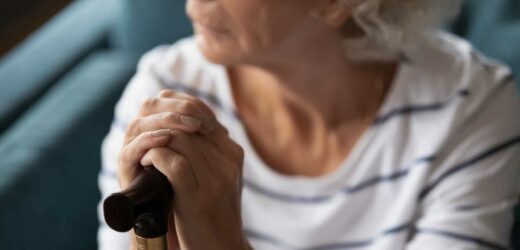AGING is a completely normal process and happens to all of us.
However we might try to conceal it with different products or health care regimes, the number just keeps ticking up.
Now medics have found that your sense of smell could give you away when it comes to marking down your true age.
A loss of smell has been found to be a common symptom in neurodegenerative diseases.
These are debilitating conditions, with the risk increasing with age.
They include Parkinson's and Alzheimer's.
Read more on sense of smell
Covid sufferers who lost their sense of smell and taste CAN have it return
I lost my smell from Covid, I was surprised by the results of TikTok remedies
Previous studies have shown that a defective sense of smell is a sign of aging or illness.
A study of more than 2,000 people in 2019 previously found that those with a poor sense of smell had a 46 per cent higher risk of dying within a ten year period than those with an ordinary sense of smell.
In 2017, another paper found that losing the ability to smell was also a sign of dementia, with the symptom appearing five years before the illness is diagnosed.
This is while paper in 2004 found that smell testing could help identify changes in bone health – a common factor in ageing.
Most read in Health
Dad of five died after family could not get ambulance for over an hour
Video of man jumping in leaves is ‘scariest’ doctor has seen
My manicure may have given me cancer – after nail tech was ‘too rough’
A&E and ambulance waits hit record highs as waiting lists fall by just 30k
Others tests have been able to predict a person's age just from their sense of smell.
A study by experts in San Diego in 2019 found that the instance of a poor sense of smell was 62.5 per cent greater in adults over the age of 80.
It also found that 24.5 per cent of those aged 53 to 97 have an impairment when it comes to their sense of smell.
Medics in the US have now also devised a new test that could reveal your true age.
Researchers from Johns Hopkins said a smell test can help doctors screen older adults for signs of unhealthy aging and fragility.
This means that depending on how strong or weak your sense of smell is, medics might be able to pinpoint how well you're ageing and your overall age.
This could mean that people who don't look after themselves, might have a worse sense of smell, meaning they have aged at a faster rate.
Writing in the Journal of Gerontology, medics looked at olfactory sensitivity and olfactory identification.
These tests helped reveal a person's ability to detect an odor and their ability to name it and differentiate it from other smells.
"We found that both impaired olfactory identification and sensitivity functions are associated with frailty, which is interesting because it shows that it’s not just your aging brain at work here.
"But it may also be something peripheral, like something at the level of your nose that is able to predict our impending frailty and death," corresponding author Nicholas Rowan, M.D., associate professor of otolaryngology – head and neck surgery at John Hopkins said.
He added that our sense of smell is something that weakens as we age.
In order to come to this conclusion, the experts looked at data from over 1,160 adults.
All participants were exposed to five scents to measure identification skills and six scents to measure sensitivity.
These results were then matched to how frail each person is.
The results found that for each increase in smell sensitivity, fragility status also declined.
This suggests that the ability to smell well has a connection to better health overall.
Read More on The Sun
Video of man jumping in leaves is ‘scariest’ doctor has seen
I’m plus-size & the Poundland seamless sets are better quality than Primark
Prof Rowan added: "We already do tests to assess how well we can see or hear, and it’s just as easy to conduct a simple smell test that takes only minutes, which could potentially be used as a valuable tool to assess the risk of frailty or unhealthy aging,.
"For example, if someone flunks a smell test then maybe this patient needs to improve their nutrition or undergo a more detailed neurological or medical workup."
Source: Read Full Article










